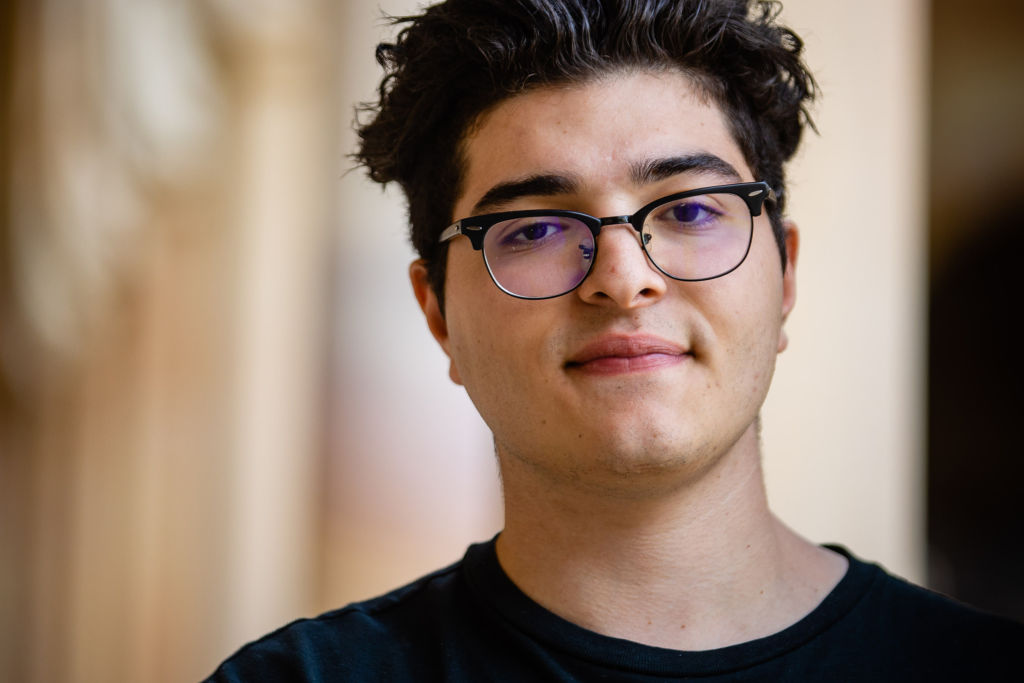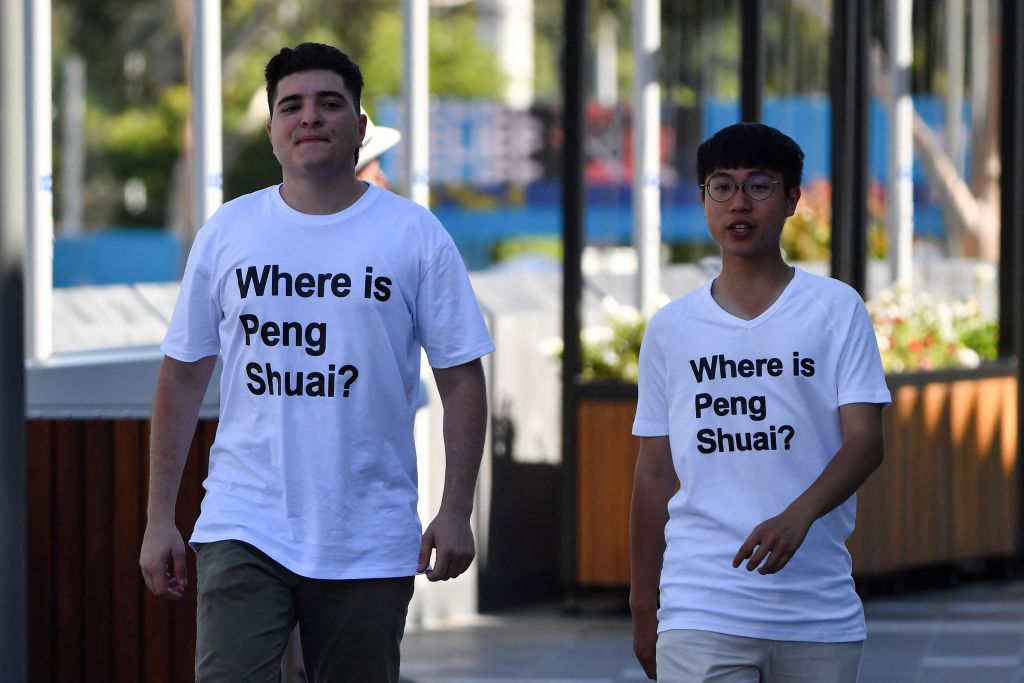
For the Chinese Communist Party (CCP), Drew Pavlou is a perennial troublemaker.
The young Australian student and human-rights activist was ejected from the Wimbledon men’s singles final in July for repeatedly shouting “where is Peng Shuai?” in reference to the Chinese tennis star who disappeared after accusing a CCP grandee of sexual assault. A month earlier, Pavlou and his friends repeatedly disrupted a speech by China’s Ambassador to Australia that was supposed to reset troubled bilateral relations. He even tried to put up billboards in his homeland linking the 2020 Beijing Winter Olympics to CCP oppression.
In fact, that Pavlou, 23, is an almighty pain in the CCP’s backside is probably the only thing the two sides can agree on. But what Pavlou strenuously denies is ever using or threatening violence. And that’s where things get tricky.
At 4:30 p.m. on July 21, Pavlou was arrested during a protest at the Chinese Embassy in London during which he brandished three flags—representing Taiwan and China’s oppressed Tibetan and Uyghur Muslim minorities—and superglued his hand to the front gate. But when London’s Metropolian Police officers arrived, they arrested him not only on suspicion of trespassing on diplomatic premises and criminal damage, as he expected, but also “communicating false information to make a bomb hoax.”
Read More: Why Peng Shuai’s Denial That She Was Sexually Assaulted Only Raises More Questions for China
During interrogation, investigating officers showed Pavlou an email from an account under his name that threatened to blow up the embassy building unless it received a reply by noon that day and steps were taken to end the oppression of the Uyghurs. Pavlou firmly denies sending it. He says he faces up to seven years if convicted.
Pavlou says he was held for 23 hours, placed into stress positions with hands handcuffed high behind his back and denied access to a lawyer. London’s Metropolitan Police tells TIME by email that “a complaint has been received” and “this is being assessed by the Met’s Directorate of Professional Standards.” Pavlou has been remanded on bail until Aug. 14 and until then is unable to leave the U.K.
More from TIME
The bomb hoax email came from the drewpavlou99@protonmail.me email address. Pavlou says he does have a Protonmail account, but that is not the one. However, the email prefix is identical to an account he has with gmail, which he says was hacked in January 2021 by someone using a Chinese IP address and later sent a slew of malicious messages to various contacts within his address book pretending to be him. Pavlou maintains that he has been set up by the CCP. “I think I was basically walking into a trap,” he tells TIME. The Chinese Embassy said by email that it had “reported to the U.K. police about the threatening mail it had received.”
It’s a fantastical accusation and Pavlou is the first to admit that his track record of courting publicity and controversy might count against him in the court of public opinion. However, a bomb hoax would certainly mark a radical escalation. “I’ve always stuck to peaceful, direct action methods,” he says.

The Risks of Criticizing the CCP
Pavlou, who is a Brisbane native and attends the city’s University of Queensland, says he first got interested in human rights activism after reading about the Rwandan genocide as a child. Since that initial awakening, he has staged protests against Myanmar’s junta, Thailand’s military government and even drove a truck of humanitarian supplies to the Ukrainian city of Lviv soon after the Russian invasion.
However, Pavlou says that “90% plus of my attention is on human rights in China.” As a result, he’s never been far from the headlines. As a student, he organized a protest in July 2019 in solidarity with Hong Kong’s democracy movement that ended in a clash with pro-Beijing counter-protesters. In December 2021, he launched his own political party and announced his intention to run for the Senate alongside the nation’s first candidates of Uyghur and Tibetan heritage. “It was basically a protest party,” he says. “Our candidates were all dissidents or had a long history of activism against the Chinese government.”
Certainly, vocal critics of the Chinese government have repeatedly complained of hacks and having emails spoofed. These are often attributed directly to operatives of the CCP’s United Front Department—which runs espionage and political influence operations overseas for the party—or zealous nationalists acting on their own. Human rights campaigner Benedict Rogers, German political scientist Andreas Fulda, anti-slavery campaigner Luke de Pulford, British MP Tom Tugendhat and academic Kevin Carrico have all spoken of similar experiences.
Carrico tells TIME that a “fake email account was set up in my name that sent a resignation letter to my university and mean, racist emails to colleagues pretending to be me.” Rogers, who runs the Hong Kong Watch NGO, says he has received and spuriously “sent” dozens of spoof emails in recent years. “The most recent one told people that we were closing down Hong Kong Watch and spending $1 million of its funding on a launch party for my new book!”
Pavlou says that when his own email was hacked, “vile” messages were sent to prominent pro-Beijing figures in an attempt to smear him. “They would post up the message and say ‘look what the critics of the Chinese government are really like,’” he says.
The bomb hoax could be a double bluff on Pavlou’s part, of course. But eyebrows were raised when China’s Ambassador to Australia, Xiao Qian, brought up his detention unprompted during a press conference on Wednesday, comparing him to Julian Assange while appearing to smirk. (It was Xiao’s speech that Pavlou and his friends had repeatedly disrupted.) “They’re just openly gloating at this point,” says Pavlou.
In any case, the miasma of doubt clouding the case has earned Pavlou some influential champions. In October, he’s due to give a speech to the Oxford University Union.
“It’s disgraceful, he shouldn’t be treated like this,” says Edward Lucas, a prominent British journalist and writer who is standing as an MP for the opposition Liberal Democrats in the next U.K. general election. “[Pavlou’s] got no record of any sort of violent public order offences, let alone terrorism, and a minute on the Internet shows that he’s a prominent human rights activist with a record of peaceful protest.”
Pavlou says that the London Police still have his cellphone but have repeatedly refused to provide his lawyers with a copy of the hoax email. He says he has run out of money and is only supporting himself thanks to donations to a GoFundMe page he’s had to set up. “I’ve been stuck here for three and a half weeks now,” he says. “My family’s worried sick. I can’t believe that this case is still ongoing and they haven’t dropped the charges.”
More Must-Reads From TIME
- The 100 Most Influential People of 2024
- The Revolution of Yulia Navalnaya
- 6 Compliments That Land Every Time
- What's the Deal With the Bitcoin Halving?
- If You're Dating Right Now , You're Brave: Column
- The AI That Could Heal a Divided Internet
- Fallout Is a Brilliant Model for the Future of Video Game Adaptations
- Want Weekly Recs on What to Watch, Read, and More? Sign Up for Worth Your Time
Write to Charlie Campbell/London at charlie.campbell@time.com